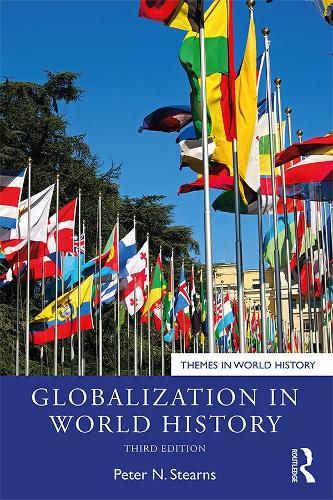Readings Newsletter
Become a Readings Member to make your shopping experience even easier.
Sign in or sign up for free!
You’re not far away from qualifying for FREE standard shipping within Australia
You’ve qualified for FREE standard shipping within Australia
The cart is loading…






In this third edition of Globalization in World History, Peter Stearns explores the roots of contemporary globalization, examining shifts in the global flow of people, goods, and ideas as early as 1000 CE. Exploring how four moments in history have accelerated the process of globalization, Stearns’s narrative details how factors such as economics, migration, disease transmission, culture, the environment, and politics have influenced the nature of globalization as we understand it today.
This revised edition includes:
Updates to the whole study with appropriate recent references;
New brief transition sections that focus attention on the Mongol period, debates over the role of the eighteenth century, and the partial retreat from globalization after World War I;
A new final chapter that deals with the rise in attacks on globalization during the most recent decade, from populist objections to the implications of growing authoritarianism, raising the question of whether a new transition is taking shape around us today.
Through an interdisciplinary approach that links political, sociological, and historical perspectives, Stearns provides a comprehensive overview of globalization and the historical factors that have shaped it. This book will be of interest to undergraduate and postgraduate students of world history, economic history, and political economy.
$9.00 standard shipping within Australia
FREE standard shipping within Australia for orders over $100.00
Express & International shipping calculated at checkout
In this third edition of Globalization in World History, Peter Stearns explores the roots of contemporary globalization, examining shifts in the global flow of people, goods, and ideas as early as 1000 CE. Exploring how four moments in history have accelerated the process of globalization, Stearns’s narrative details how factors such as economics, migration, disease transmission, culture, the environment, and politics have influenced the nature of globalization as we understand it today.
This revised edition includes:
Updates to the whole study with appropriate recent references;
New brief transition sections that focus attention on the Mongol period, debates over the role of the eighteenth century, and the partial retreat from globalization after World War I;
A new final chapter that deals with the rise in attacks on globalization during the most recent decade, from populist objections to the implications of growing authoritarianism, raising the question of whether a new transition is taking shape around us today.
Through an interdisciplinary approach that links political, sociological, and historical perspectives, Stearns provides a comprehensive overview of globalization and the historical factors that have shaped it. This book will be of interest to undergraduate and postgraduate students of world history, economic history, and political economy.